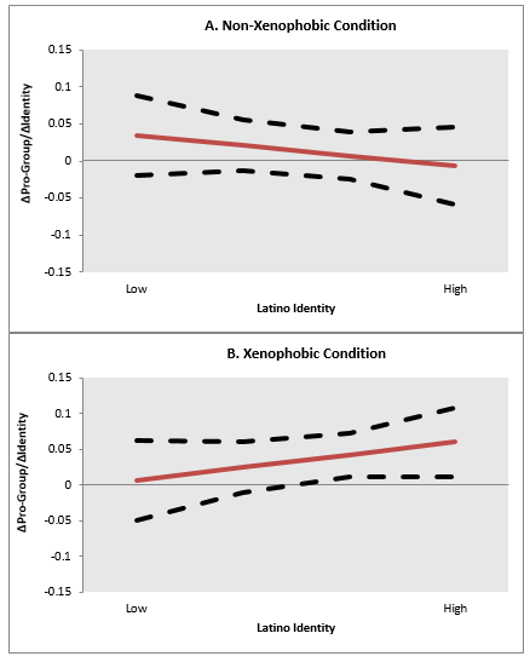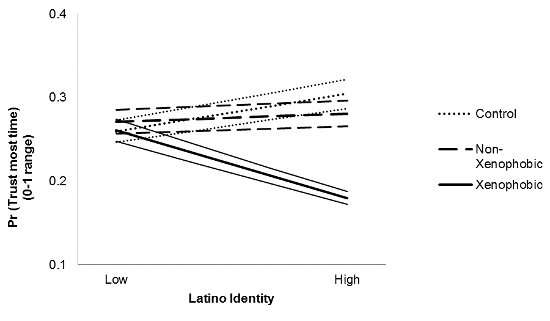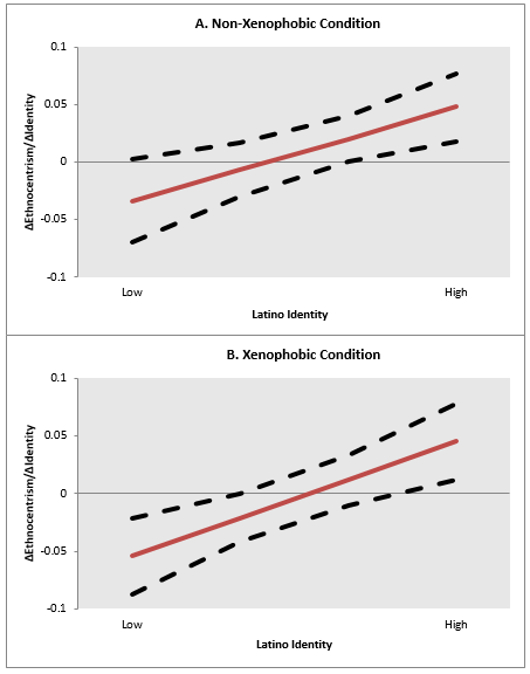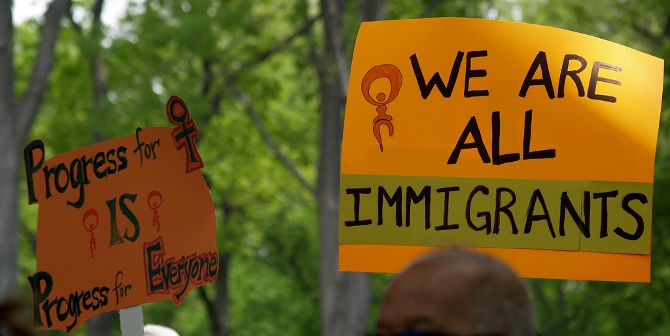 Recent months have dramatically illustrated how negative rhetoric over immigration is a staple of US politics. But when politicians decry immigration, how does this affect groups which have a large number of migrants, such as Latinos? In new research which uses a national survey of Latinos, Efrén O. Pérez finds that such criticisms mean that Latinos think of themselves as ethnics much more compared to other forms of identity like class and religion, and it also decreases their levels of political trust.
Recent months have dramatically illustrated how negative rhetoric over immigration is a staple of US politics. But when politicians decry immigration, how does this affect groups which have a large number of migrants, such as Latinos? In new research which uses a national survey of Latinos, Efrén O. Pérez finds that such criticisms mean that Latinos think of themselves as ethnics much more compared to other forms of identity like class and religion, and it also decreases their levels of political trust.
Immigrant bashing is a staple of U.S. politics. The temptation to berate foreigners for their alleged shortcomings is hard for many politicians to resist. Witness Donald Trump, who in June used the issue of illegal immigration to announce his bid for the Republican presidential nomination. “They’re bringing drugs. They’re bringing crime. They’re rapists,” he fulminated, referring to Latino (mainly Mexican) immigrants. Such rhetoric seems to pay politically. Trump now leads the Republican field of presidential hopefuls. Yet allegations like these ricochet by politically engaging Latinos—and along narrower ethnic lines, to boot.
Latinos are America’s largest ethnic group, but they are a heterogeneous bunch. Some Latinos are foreign-born, many others are native-born. Some are older, many others are younger. Some are from Mexico, others are not. These and many other differences evaporate when Latinos hear politicians discuss illegal immigration. Strident rhetoric here ignites a mental chain reaction that yields a brand of politics that affirm and favor one’s ethnic group above others. Here is why.
When politicians decry illegal immigration, they accomplish two things among Latinos, perhaps without intending to. First, they raise the importance of ethnicity relative to other forms of identity. That is, they make Latinos think of themselves as ethnics, rather than as working class, Catholic, Democrats, etc. Second, they smear this identity’s value. By focusing on a negative aspect (i.e., illegal immigration) of a larger group (Latinos), the high worth that some Latinos place on their ethnicity is degraded. It is comparable to focusing on welfare recipients when talking about African Americans or centering on terrorists in political discussions of Muslims. Political rhetoric like this jeopardizes the cachet of one’s group.
This identity threat generates deep political consequences for group members—consequences that hinge on the strength of ethnic identity among Latinos. Those who strongly identify as Latino (“high identifiers”) engage in political efforts that restore their identity’s positive value by favoring their group in politics and society. Those weakly attached to their group (“low identifiers”) shun political opportunities to bolster their group’s devalued status.
The evidence for all this comes from a national survey of Latino adults that I conducted well before Trump made illegal immigration leading news once again. The first part of the survey measured several opinions, including participants’ strength of Latino identity. I did this by asking them to answer the statement: “Being Latino is unimportant to my sense of what kind of person I am.” Insofar as one has a stronger level of Latino identity, one should disagree or strongly disagree with this statement. And, inasmuch as one has a weaker Latino identity, one should agree or strongly agree with this declaration. Thus, high identifiers on this scale score “4” and “3,” while low identifiers score “2” and “1.”
Well after this, during the middle of the survey, participants were randomly assigned to one of three conditions: 1) a control group, where they received no information; 2) a non-xenophobic condition, where an unnamed Member of Congress drew attention to the issue of illegal immigration; and, 3) a xenophobic condition where the same lawmaker focused on illegal immigration and made negative allegations about illegal immigrants. This last condition is what should rile up high identifying Latinos, while leading low identifying Latinos to politically abandon their group. In order to gauge this reaction, I had participants answer questions gauging their level of support for pro-group policies; political trust, and ethnocentrism.
These tools let me show that xenophobic rhetoric galvanizes high identifying Latinos to express more group-centered opinions than they would in its absence. Figure 1 shows that when the politician in the non-xenophobic condition says that Congress should address illegal immigration, no reliable difference emerges between low and high identifiers as to whether “Latinos should always vote for Latino candidates” and “Latino children should study and maintain the Spanish language” – the kind of opinions in my pro-group politics measure. But when the politician says the same thing and makes negative allegations about illegal immigrants, high identifiers are more supportive of such policies, as reflected in the upward sloping line.
Figure 1 – The Effect of Xenophobic Rhetoric on Pro-Group Politics by Latino Identity (with 90 percent confidence intervals)

This “hunkering” effect among high identifiers is further illustrated by Latinos’ level of political trust when they are exposed to xenophobic rhetoric. To the extent that a perceived assault on one’s sense of Latino identity promotes a turn toward one’s ethnic group, we should find a distancing from mainstream society, as reflected by decreases in political trust: “the degree to which people perceive the government is producing outcomes consistent with their expectations.” Political trust is lifeblood to democratic polities like the U.S. because it fosters cooperation between diverse constituencies and interests. Yet xenophobic rhetoric stanches its flow.
Figure 2 shows that high identifying Latinos are much less likely to express political trust when exposed to the type of anti-immigrant rhetoric I have described. In light of xenophobic rhetoric, the probability of trusting government “most of the time” declines across higher levels of Latino identity, as seen in the downward trending line. Among low identifiers in the xenophobic condition, the likelihood of trusting government “most of the time” is 26 percent. Among high identifiers, the probability of displaying this attitude drops to 18 percent. This gap is reliable and contrasts with the pattern displayed by low and high identifiers in the other two conditions, where no trust gap emerges between high and low identifiers.
Figure 2 – Effect of Immigration Rhetoric on Trusting “Most of the Time” by Latino Identity (with 90 percent confidence intervals)

Perhaps even more distressing, xenophobic rhetoric increases ethnocentrism among Latinos. As Kinder and Kam explain: “To those given to ethnocentrism, in-groups are communities of virtue, trust, and cooperation, safe and superior havens. Out-groups…are not.” The signature mark of ethnocentrism is to favor one’s co-ethnics and view them favorably, a streak sometimes accompanied by hostility toward those outside one’s group. Figure 3 shows us that only in the wake of xenophobic rhetoric do high identifying Latinos express more ethnocentrism, while low identifiers express reliably less—a trend reflected in the fact that both effects are distinguishable from zero in this condition. This pro-Latino sentiment, however, is unrelated to negative feelings toward non-Latinos. That is, high identifying Latinos do not become more anti-White or anti-Black in light of xenophobic rhetoric, suggesting an inclination to bolster one’s group politically without taking down others.
Figure 3 – Marginal Effect of Immigration Rhetoric on Ethnocentrism by Latino Identity (with 90 percent confidence intervals)

Most of the reactions I just described are strongest among the foreign-born (first generation), present but weaker among their children (second generation), and dissipate among their grandchildren and great grandchildren (third generation or later). This suggests that politics can limit the incorporation of immigrant groups into America’s political and cultural mainstream. Indeed, a popular ideal our country aspires to is having immigrants and their offspring assimilate, such that the relevance of ethnicity weakens for members of these groups. Within many immigrant groups, this process unfolds monotonically over time and across generations. Yet this linear trend toward assimilation is sometimes interrupted and segmented. My results illuminate such breaks in trends toward assimilation. In particular, they underscore the point that the assimilation of immigrant groups can be facilitated through politics—and, it can be made much more difficult just as well.
This article is based on the paper, ‘Xenophobic Rhetoric and Its Political Effects on Immigrants and Their Co-Ethnics’, in the American Journal of Political Science.
Featured image credit: takomabibelot (CC-BY-2.0)
Please read our comments policy before commenting.
Note: This article gives the views of the author, and not the position of USAPP – American Politics and Policy, nor the London School of Economics.
Shortened URL for this post: http://bit.ly/1UYQPyO
_________________________________
 Efrén Pérez – Vanderbilt University
Efrén Pérez – Vanderbilt University
Efrén Pérez is Assistant Professor of Political Science and Sociology (by courtesy) at Vanderbilt University. He is also Co-Director of its Research on Individuals, Politics, and Society (RIPS) experimental lab. He conducts research on group identity, language and political choice, and implicit political cognition. He is the author of Unspoken Politics: Implicit Attitudes and Political Thinking, which is forthcoming at Cambridge University Press.





Re assimilation: Here’s my top-ten list of what we should expect from those who want to become Americans (and those who are already Americans, for that matter). The list was first published in a National Review Online column [link: http://www.nationalreview.com/article/378393/e-pluribus-unum-roger-clegg ], and it is fleshed out in Congressional testimony [link: http://www.aila.org/content/fileviewer.aspx?docid=23115&linkid=164788 ]:
1. Don’t disparage anyone else’s race or ethnicity.
2. Respect women.
3. Learn to speak English.
4. Be polite.
5. Don’t break the law.
6. Don’t have children out of wedlock.
7. Don’t demand anything because of your race or ethnicity.
8. Don’t view working and studying hard as “acting white.”
9. Don’t hold historical grudges.
10. Be proud of being an American.
And what should we expect from white American born?
1. they are he first to disparage race and ethnicity by holding an eurocentric ideals.
2. There is little respect for women. In a country where a political figure is allowed to disparate female poiltical candidates and incidences of domestic violence is through the roof- sad.
3. Check the statistics- poor white children are also dropping out and not attending colleges. they barely know how to read English.
4. In terms of politness— The things that White americans feel entitle to say about African Americans and other races hardly constitutes politness.
5. Whites break the law and have children out of wedlock- this is not endemic to immigrants.
6. Immigrants should stop demanding things due to their ethnicity when whites stop using race privilege to get ahead!
7. Whites don’t study hard- they just come accross more opportunities and advantages.
8. Recognize historical white atrocities-slavery, unfair laws, police brutality, racism and discrimination, the killing of native americans
9 Immigrants become proud Americans- they in fact become Americans by choice not be accidental birth!